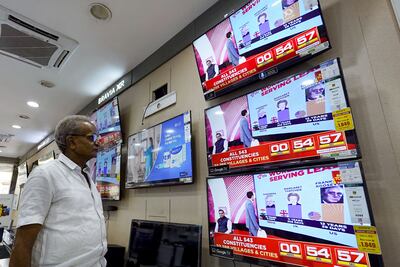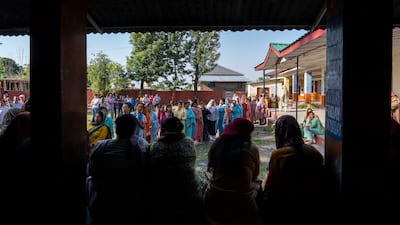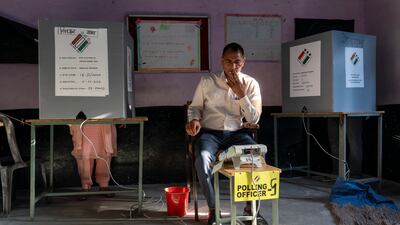Indian exit polls were forecasting a landslide victory for Prime Minister Narendra Modi after the world’s largest elections concluded on Saturday following an electrifying poll campaign that lasted 44 days.
India began electing 543 members of the Lok Sabha – the lower house of Parliament – on April 19, with 57 seats holding votes on Saturday in the seventh and final round of the staggered elections.
The results are expected on June 4, but a series of exit polls by private news broadcasters predicted a thumping majority to the incumbent Bharatiya Janata Party (BJP) led by Mr Modi.
In opposition is the INDIA bloc, an alliance of 26 regional and national parties led by its main partner, the Indian National Congress (INC).
Seven exit polls predicted a range of 342 and 383 seats for the ruling National Democratic Alliance (NDA), of which BJP is a member, while the INDIA bloc could win between 118 and 182 seats.
News channel ABP-C Voter predicted NDA could achieve between 353 to 383 seats, while another broadcaster, News Nation, gave the ruling alliance between 342 to 378 seats.
A political party or an alliance of parties needs 272 seats to form a government.
Exit polls are banned in India until the voting is concluded and many times such polls have failed to predict the results.
Mr Modi has shown confidence that his party will sweep the polls, even claiming that BJP will cross 400 seats and form a government for a record third term.
India’s first Prime Minister Jawaharlal Nehru is the only leader to have won three consecutive terms.
The NDA had won 353 seats in 2019, out of which 303 seats were won by the BJP. The Congress had won 52 seats.
The exit polls predicted clean sweeps for the BJP in the Hindi-heartland states of Uttar Pradesh, Madhya Pradesh, Bihar, and Chhattisgarh. It has faced some setbacks in the stronghold states of Maharashtra, Rajasthan, and Haryana, exit polls said.
But polls predicted a strong showing by the Hindu nationalist party in the South Indian states of Tamil Nadu and Kerala, where Mr Modi’s party has struggled to garner support and making gains in eastern West Bengal and Odisha states.
The opposition bloc has largely retained its strongholds and made some inroads in Haryana and Rajasthan.
However, it has failed to make a mark in the battleground state of Uttar Pradesh, where exit polls are predicting the BJP to win between 67 to 74 seats out of 80.
Mr Modi on Saturday thanked voters for their active participation in the elections.
“India has voted! A heartfelt thank you to all those who exercised their franchise. Their active participation is the cornerstone of our democracy,” he wrote on X, shortly after polling concluded on Saturday.
Several political commentators have predicted a third term for Mr Modi because of his Hindu strongman image and popularity among the masses.
However, disenchantment among voters over widespread unemployment and growing social and religious divisions were believed to be a bane for the ruling party.
Some strategists have predicted BJP to emerge as the single largest party, but would struggle to form a government on its own.
They blame a drop in Mr Modi's popularity, even claiming that his hardcore voter base – right-wing Hindus – is exasperated with the leader’s anti-Muslim rhetoric during the election campaign.
Prashant Kishor, a prominent political strategist who worked with the BJP in 2014 when Mr Modi first came to power, has predicted that the party will win less than 300 seats.
Yogendra Yadav, another psephologist-turned-politician instrumental in the rise of the Aam Aadmi Party in the capital New Delhi, has predicted that the party may not even win 270 seats.
The number of constituencies Mr Modi’s party wins is crucial for the leader for his reputation and relevance.
He recently said that he was “not born but was sent by God to work for humanity”.
“At the very least the BJP will be the single largest party, whether they’ll win 230 seats or above 300. I do not think Congress can beat it. BJP will get the first shot at forming the government, if not, they will form a government by reaching out to allies,” Aarti Jerath, a Delhi-based political analyst said, told The National.
“But if the BJP gets somewhere in the range of 230-250 seats, it will be a moral defeat for the BJP because it will get fewer seats from the last time. I don’t see Mr Modi as a leader accepting a moral defeat,” she said.
The candidates
Dr Ayham Ammora, scientist and business executive
Ali Azeem, business leader
Tony Booth, professor of education
Lord Browne, former BP chief executive
Dr Mohamed El-Erian, economist
Professor Wyn Evans, astrophysicist
Dr Mark Mann, scientist
Gina MIller, anti-Brexit campaigner
Lord Smith, former Cabinet minister
Sandi Toksvig, broadcaster
War 2
Director: Ayan Mukerji
Stars: Hrithik Roshan, NTR, Kiara Advani, Ashutosh Rana
Rating: 2/5
SPECS
%3Cp%3E%3Cstrong%3EEngine%3C%2Fstrong%3E%3A%202-litre%20direct%20injection%20turbo%20%0D%3Cbr%3E%3Cstrong%3ETransmission%3C%2Fstrong%3E%3A%207-speed%20automatic%20%0D%3Cbr%3E%3Cstrong%3EPower%3C%2Fstrong%3E%3A%20261hp%20%0D%3Cbr%3E%3Cstrong%3ETorque%3C%2Fstrong%3E%3A%20400Nm%20%0D%3Cbr%3E%3Cstrong%3EPrice%3C%2Fstrong%3E%3A%20From%20Dh134%2C999%26nbsp%3B%3C%2Fp%3E%0A
The National Archives, Abu Dhabi
Founded over 50 years ago, the National Archives collects valuable historical material relating to the UAE, and is the oldest and richest archive relating to the Arabian Gulf.
Much of the material can be viewed on line at the Arabian Gulf Digital Archive - https://www.agda.ae/en
Managing the separation process
- Choose your nursery carefully in the first place
- Relax – and hopefully your child will follow suit
- Inform the staff in advance of your child’s likes and dislikes.
- If you need some extra time to talk to the teachers, make an appointment a few days in advance, rather than attempting to chat on your child’s first day
- The longer you stay, the more upset your child will become. As difficult as it is, walk away. Say a proper goodbye and reassure your child that you will be back
- Be patient. Your child might love it one day and hate it the next
- Stick at it. Don’t give up after the first day or week. It takes time for children to settle into a new routine.And, finally, don’t feel guilty.
The Brutalist
Director: Brady Corbet
Stars: Adrien Brody, Felicity Jones, Guy Pearce, Joe Alwyn
Rating: 3.5/5
Company profile
Company name: Suraasa
Started: 2018
Founders: Rishabh Khanna, Ankit Khanna and Sahil Makker
Based: India, UAE and the UK
Industry: EdTech
Initial investment: More than $200,000 in seed funding
GOLF’S RAHMBO
- 5 wins in 22 months as pro
- Three wins in past 10 starts
- 45 pro starts worldwide: 5 wins, 17 top 5s
- Ranked 551th in world on debut, now No 4 (was No 2 earlier this year)
- 5th player in last 30 years to win 3 European Tour and 2 PGA Tour titles before age 24 (Woods, Garcia, McIlroy, Spieth)
In-demand jobs and monthly salaries
- Technology expert in robotics and automation: Dh20,000 to Dh40,000
- Energy engineer: Dh25,000 to Dh30,000
- Production engineer: Dh30,000 to Dh40,000
- Data-driven supply chain management professional: Dh30,000 to Dh50,000
- HR leader: Dh40,000 to Dh60,000
- Engineering leader: Dh30,000 to Dh55,000
- Project manager: Dh55,000 to Dh65,000
- Senior reservoir engineer: Dh40,000 to Dh55,000
- Senior drilling engineer: Dh38,000 to Dh46,000
- Senior process engineer: Dh28,000 to Dh38,000
- Senior maintenance engineer: Dh22,000 to Dh34,000
- Field engineer: Dh6,500 to Dh7,500
- Field supervisor: Dh9,000 to Dh12,000
- Field operator: Dh5,000 to Dh7,000
More from Rashmee Roshan Lall
Key figures in the life of the fort
Sheikh Dhiyab bin Isa (ruled 1761-1793) Built Qasr Al Hosn as a watchtower to guard over the only freshwater well on Abu Dhabi island.
Sheikh Shakhbut bin Dhiyab (ruled 1793-1816) Expanded the tower into a small fort and transferred his ruling place of residence from Liwa Oasis to the fort on the island.
Sheikh Tahnoon bin Shakhbut (ruled 1818-1833) Expanded Qasr Al Hosn further as Abu Dhabi grew from a small village of palm huts to a town of more than 5,000 inhabitants.
Sheikh Khalifa bin Shakhbut (ruled 1833-1845) Repaired and fortified the fort.
Sheikh Saeed bin Tahnoon (ruled 1845-1855) Turned Qasr Al Hosn into a strong two-storied structure.
Sheikh Zayed bin Khalifa (ruled 1855-1909) Expanded Qasr Al Hosn further to reflect the emirate's increasing prominence.
Sheikh Shakhbut bin Sultan (ruled 1928-1966) Renovated and enlarged Qasr Al Hosn, adding a decorative arch and two new villas.
Sheikh Zayed bin Sultan (ruled 1966-2004) Moved the royal residence to Al Manhal palace and kept his diwan at Qasr Al Hosn.
Sources: Jayanti Maitra, www.adach.ae
THE POPE'S ITINERARY
Sunday, February 3, 2019 - Rome to Abu Dhabi
1pm: departure by plane from Rome / Fiumicino to Abu Dhabi
10pm: arrival at Abu Dhabi Presidential Airport
Monday, February 4
12pm: welcome ceremony at the main entrance of the Presidential Palace
12.20pm: visit Abu Dhabi Crown Prince at Presidential Palace
5pm: private meeting with Muslim Council of Elders at Sheikh Zayed Grand Mosque
6.10pm: Inter-religious in the Founder's Memorial
Tuesday, February 5 - Abu Dhabi to Rome
9.15am: private visit to undisclosed cathedral
10.30am: public mass at Zayed Sports City – with a homily by Pope Francis
12.40pm: farewell at Abu Dhabi Presidential Airport
1pm: departure by plane to Rome
5pm: arrival at the Rome / Ciampino International Airport
Hot%20Seat
%3Cp%3EDirector%3A%20James%20Cullen%20Bressack%3Cbr%3E%3Cbr%3EStars%3A%20Mel%20Gibson%2C%20Kevin%20Dillon%2C%20Shannen%20Doherty%2C%20Sam%20Asghari%3Cbr%3E%3Cbr%3ERating%3A%201%2F5%3C%2Fp%3E%0A
Specs
Engine: Electric motor generating 54.2kWh (Cooper SE and Aceman SE), 64.6kW (Countryman All4 SE)
Power: 218hp (Cooper and Aceman), 313hp (Countryman)
Torque: 330Nm (Cooper and Aceman), 494Nm (Countryman)
On sale: Now
Price: From Dh158,000 (Cooper), Dh168,000 (Aceman), Dh190,000 (Countryman)
The specs: 2018 Dodge Durango SRT
Price, base / as tested: Dh259,000
Engine: 6.4-litre V8
Power: 475hp @ 6,000rpm
Torque: 640Nm @ 4,300rpm
Transmission: Eight-speed automatic
Fuel consumption, combined: 7.7L / 100km
What can victims do?
Always use only regulated platforms
Stop all transactions and communication on suspicion
Save all evidence (screenshots, chat logs, transaction IDs)
Report to local authorities
Warn others to prevent further harm
Courtesy: Crystal Intelligence
In numbers: China in Dubai
The number of Chinese people living in Dubai: An estimated 200,000
Number of Chinese people in International City: Almost 50,000
Daily visitors to Dragon Mart in 2018/19: 120,000
Daily visitors to Dragon Mart in 2010: 20,000
Percentage increase in visitors in eight years: 500 per cent
High profile Al Shabab attacks
- 2010: A restaurant attack in Kampala Uganda kills 74 people watching a Fifa World Cup final football match.
- 2013: The Westgate shopping mall attack, 62 civilians, five Kenyan soldiers and four gunmen are killed.
- 2014: A series of bombings and shootings across Kenya sees scores of civilians killed.
- 2015: Four gunmen attack Garissa University College in northeastern Kenya and take over 700 students hostage, killing those who identified as Christian; 148 die and 79 more are injured.
- 2016: An attack on a Kenyan military base in El Adde Somalia kills 180 soldiers.
- 2017: A suicide truck bombing outside the Safari Hotel in Mogadishu kills 587 people and destroys several city blocks, making it the deadliest attack by the group and the worst in Somalia’s history.
BMW M5 specs
Engine: 4.4-litre twin-turbo V-8 petrol enging with additional electric motor
Power: 727hp
Torque: 1,000Nm
Transmission: 8-speed auto
Fuel consumption: 10.6L/100km
On sale: Now
Price: From Dh650,000
UAE currency: the story behind the money in your pockets
Key facilities
- Olympic-size swimming pool with a split bulkhead for multi-use configurations, including water polo and 50m/25m training lanes
- Premier League-standard football pitch
- 400m Olympic running track
- NBA-spec basketball court with auditorium
- 600-seat auditorium
- Spaces for historical and cultural exploration
- An elevated football field that doubles as a helipad
- Specialist robotics and science laboratories
- AR and VR-enabled learning centres
- Disruption Lab and Research Centre for developing entrepreneurial skills









